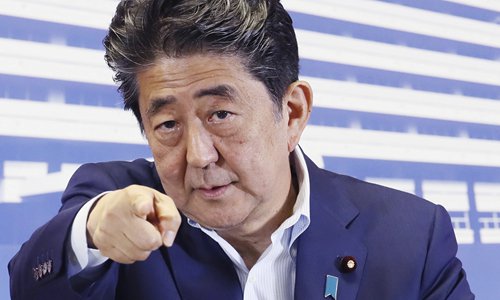HOME >> OPINION
Japan’s aid to Africa influenced by ideological, security calculations
By Chen Yang Source:Global Times Published: 2019/9/3 20:18:40

Photo: IC
The Seventh Tokyo International Conference on African Development (TICAD-7) ended in Japan's port city of Yokohama on Friday. Speaking to reporters at the end of the conference, Japanese Prime Minister Shinzo Abe warned African leaders about "debt sustainability," and emphasized that "in providing assistance to Africa, we have to take note of the debt burden of the recipient country and take care that the debt burden does not become excessive." Abe's remarks were a clear swipe at China.
In addition, participating countries adopted the Japan-drafted Yokohama Declaration which includes Abe's Free and Open Indo-Pacific initiative. This reflects Japan's intention to not only vie for influence with China on the African continent but also alienate those countries from China in terms of security and pull them over to its side.
The TICAD was initiated by Japan in 1993 and was initially held every five years. Since 2016, the event has been held every three years. Besides providing economic assistance to Africa and helping with the continent's development, Japan launched TICAD with a deeper purpose - to seek support from African countries so it could win permanent membership of the UN Security Council. The motive was impure. To this day, Tokyo still hopes to solicit support from Africa so it can become one of the permanent members of the UN Security Council.
Seven years after the first TICAD, the Forum on China-Africa Cooperation (FOCAC) was launched under the framework of South-South cooperation, featuring "equal consultation, enhancing understanding, expanding consensus, strengthening friendship, and promoting cooperation."
Although established later, FOCAC has made remarkable progress through pragmatic cooperation between China and Africa, promoting Africa's employment, finance, public health, and infrastructure.
A 2017 McKinsey report indicated that 89 percent of employees were African at over 10,000 Chinese-owned businesses operating on the continent across eight countries. Xinhua News Agency reported that trade volume in 2018 between China and Africa amounted to $204.2 billion, while the volume was only $10 billion in 2000.
Japan began providing economic assistance to Africa much earlier than China after the Cold War, but its influence and impact on the continent cannot match China's. The Japan Times reported that Japanese firms have businesses in 800 locations across Africa. Today, 3,700 Chinese enterprises conduct business in Africa. It is estimated that some 1 million Chinese live on the continent compared to the 8,000 Japanese who live there.
TICAD has focused on economic aid, while FOCAC's efforts have been centered on investing in Africa. Although both promote development, investment is more beneficial for employment. Instead of hyping the so-called debt trap issue, Japan should rethink if their contribution to Africa is sufficient and why China has gained wide recognition from African countries.
The inclusion of the Free and Open Indo-Pacific initiative in the Yokohama Declaration highlights Japan's selfishness in assisting Africa. Although, it would be an over-exaggeration to label Japan's efforts as an attempt at "containing China," such action at least reflects its intention to force Africa to choose sides, thus placing its sincerity in doubt.
African countries will make a clear judgment on this issue and will not be led by Japan's nose. After all, the friendship between China and Africa has undergone historical tests.
Japan's investment, assistance, and influence in Africa have been dwarfed by China's contributions. Within this framework, Japan is playing the ideological and security cards.
Africa is an independent and open continent, and Africans have the right to choose cooperation partners and development models, especially economic models that alleviate poverty and create jobs. In this regard, China's development experience and model have greater value. However, this does not mean that the China model is the continent's only option.
If Japan's care for Africa is not aimed at the well-being of Africans and is focused solely on the competition of big powers, the division of influence spheres and ideology, it will hardly win the support of Africans no matter how successful TICAD is or how much it supposedly aids.
The author is a media professional and a Japan watcher. opinion@globaltimes.com.cn
Posted in: VIEWPOINT